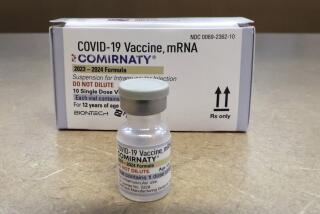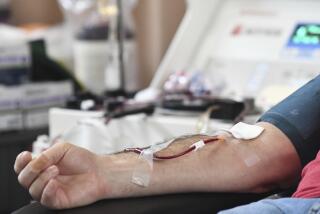CDC Recommends Yearly AIDS Tests
- Share via
ATLANTA — Hoping to head off a surge of infections, the government recommended for the first time Thursday that sexually active gay and bisexual men get tested at least once a year for the AIDS virus.
Previous guidelines from federal health officials had been less specific, urging doctors to recommend HIV tests for patients whose behavior might put them at risk for infection.
But studies conducted in the last few years have shown gay and bisexual men, possibly lulled into complacency by medical breakthroughs that have allowed AIDS patients to live longer, are having more unprotected sex.
Rates of syphilis and gonorrhea are up among gay and bisexual men in many U.S. cities, and health officials worry those diseases signal a coming spike in HIV and AIDS rates.
The new guidelines, released by the Centers for Disease Control and Prevention, recommend annual screening for HIV, chlamydia, syphilis and gonorrhea for gay and bisexual men--plus vaccination against hepatitis A and B.
The CDC said some men in high-risk groups may need to be screened more often.
“There has been an increase in awareness of the level of risk behavior of men who have sex with men,” said the CDC’s Dr. Stuart Berman.
The guidelines also urge doctors to ask their male patients about the gender of their sex partners, a question CDC experts say doctors are sometimes hesitant to ask.
“It’s important for them to provide educational messages about what’s important in terms of safe-sex behavior,” said lead author Dr. Kimberly Workowski. “A lot of times providers have reticence in asking their patients these questions.”
The CDC updates its guidelines on sexually transmitted diseases about every four years. They were first published in 1982, and the last set was issued in 1998.
Among other changes in the new guidelines:
* The CDC recommended expanded screening among women for chlamydia, the most commonly reported STD. Women with chlamydia infections should be tested again three to four months after they finish treatment.
* The agency said doctors in California should not use a class of antibiotics called fluoroquinolones to treat gonorrhea. Strains of gonorrhea resistant to that class of drugs have become common on the West Coast.
Gonorrhea infections already have developed widespread resistance to treatment with penicillin and tetracycline.
* The CDC said nonoxynol-9, a spermicide, should not be used as a way to prevent STDs





